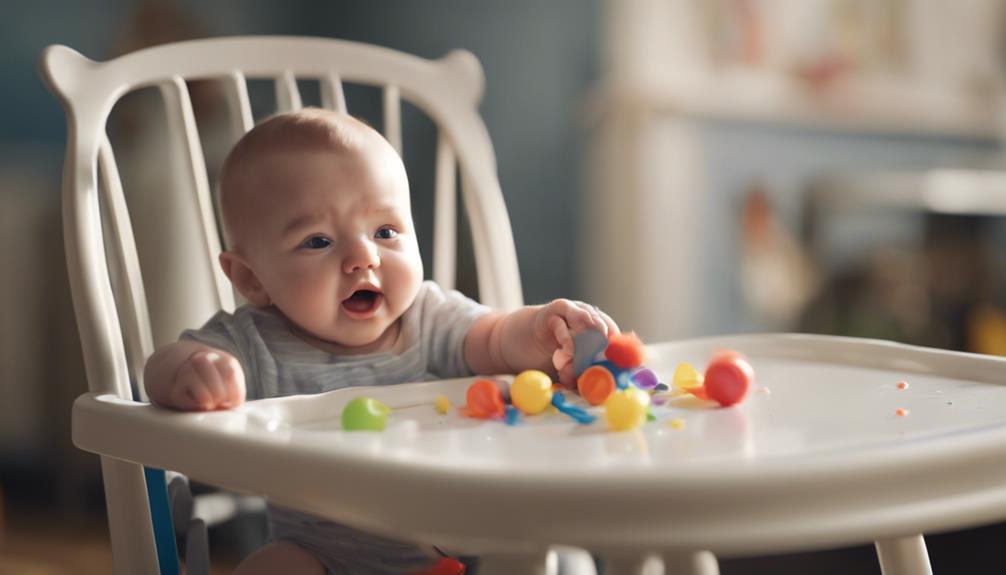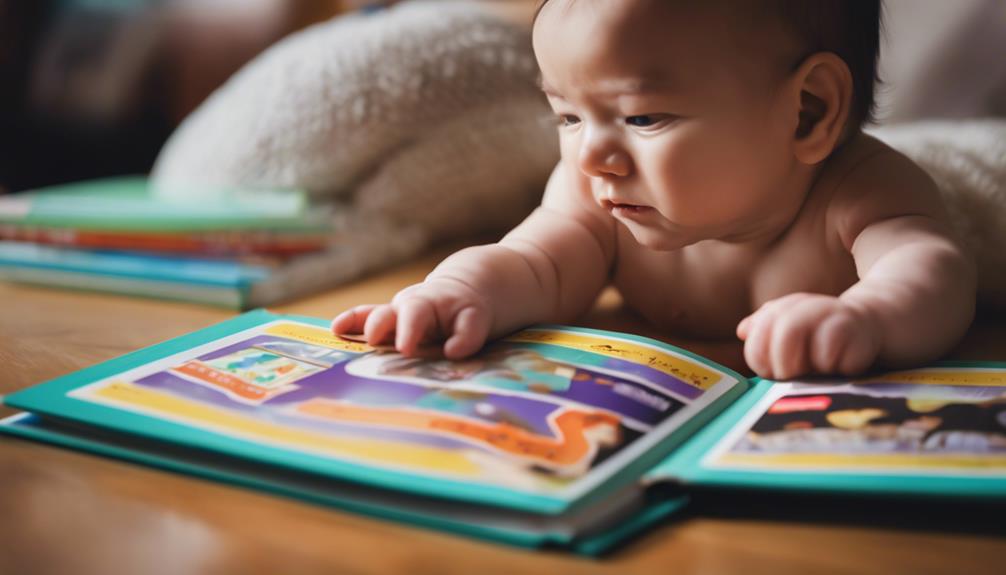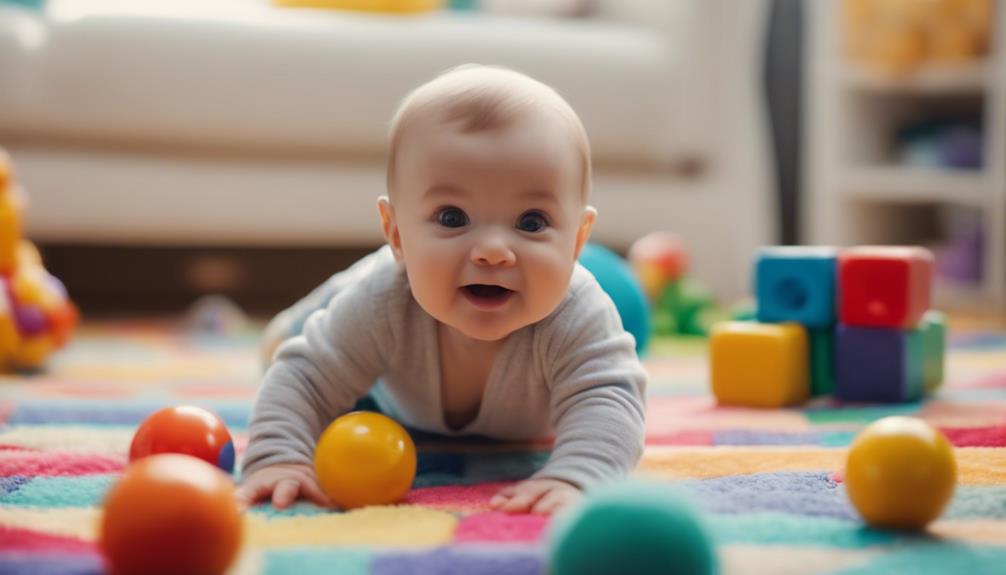At 5 months, your baby is developing social skills through seeking attention, making eye contact, and recognizing familiar faces. They express joy with loved ones and respond to gestures promptly, laying the groundwork for social interactions. Encouraging them to respond to their name helps strengthen connections and foster social growth. Engaging in play activities like peek-a-boo and mirror games helps them learn about interaction and self-awareness. Understanding cause and effect can spark their curiosity and problem-solving abilities. Spending one-on-one time with caregivers is crucial for their social development. Forming a secure attachment to primary caregivers at this stage lays the foundation for future relationships. You are witnessing important milestones that are shaping your baby’s social world.
Key Takeaways
- Making eye contact, tracking adults
- Responding to gestures promptly
- Recognizing familiar faces, distinguishing strangers
- Forming strong attachment to primary caregiver
- Expressing joy, happiness with familiar individuals
Social Interaction Milestones
By 5 months old, your baby achieves significant social interaction milestones, such as seeking attention during conversations and making eye contact with familiar faces.
Your baby's social development at this stage involves an increased awareness of facial expressions and the ability to respond to your baby's cues.
When interacting with familiar individuals, your baby may exhibit joy and happiness, showcasing the growing social bonds they're forming.
It's common for babies at 5 months to interrupt conversations by making noises and smiling, indicating their desire for interaction.
They start distinguishing between familiar faces and strangers, tracking adults with their eyes, and using sounds and gestures to express emotions.
Encouraging smiling, reacting to your baby's sounds, and engaging in interactive activities can further support and enhance their social development.
These early milestones in social interaction lay the foundation for more complex communication skills to develop as your baby grows.
Name Recognition and Responses

Your 5-month-old baby may begin to show signs of recognizing their name and responding to it with excitement or interest. This milestone in name recognition is an essential part of your baby's social development and cognitive abilities.
Here are some key points to keep in mind:
- Growing Awareness: Responding to their name shows that your baby is becoming more aware of their surroundings and the people in it.
- Establishing Connections: By recognizing their name, babies start to establish connections with their caregivers and understand their place within their social environment.
- Bond Strengthening: Encouraging name recognition can help strengthen the bond between your baby and their caregivers, fostering a sense of security and trust in their relationships.
As your baby responds to their name with enthusiasm, remember to continue using positive reinforcement to nurture their social development and deepen their connection with you and other caregivers.
Playtime and Skill Development

Engage your 5-month-old baby in interactive playtime activities to foster social interaction and skill development. Encourage imitation of facial expressions and gestures during play, promoting social skills and communication abilities. Provide toys like rattles, soft books, and colorful objects to stimulate senses and curiosity, aiding in exploration. Create a safe environment for play that encourages physical movement, cognitive development, and social engagement. Use playtime to strengthen the parent-child bond, fostering positive associations with social interactions for overall social and emotional development.
| Play Activities | Benefits | Tips |
|---|---|---|
| Peek-a-boo | Promotes social interaction and bonding | Use different variations for added fun |
| Mirror play | Encourages imitation and self-awareness | Make silly faces to elicit responses |
| Toy exploration | Stimulates senses and curiosity | Rotate toys to keep interest high |
| Rattles | Develops hand-eye coordination and auditory senses | Use different textures for sensory input |
| Soft books | Enhances cognitive development and language skills | Point out colors and shapes during play |
Understanding Cause and Effect

At 5 months old, your baby is beginning to understand cause and effect relationships. They learn that their actions lead to specific outcomes, sparking curiosity and exploration.
Encourage their learning by engaging in simple experiments at home that help build cognitive connections.
Baby's Reaction Patterns
Understanding cause and effect is a key aspect of a 5-month-old baby's developing cognitive abilities, as they begin to realize the impact of their actions on the world around them. As your baby learns to interact with their environment, they may exhibit specific reaction patterns that indicate their growing understanding of cause and effect:
- Excitement and Surprise: Your baby may show excitement or surprise when they discover they can make things happen by their actions, such as making a toy light up by pressing a button.
- Curiosity and Exploration: Encourage your baby to explore cause and effect by providing toys or activities that allow them to experiment with different scenarios, fostering their problem-solving skills.
- Building Cognitive Connections: Through engaging in cause-and-effect activities, your baby is actively building essential cognitive connections in their developing brain, setting the stage for future learning and development.
Simple Experiments at Home
Demonstrate cause and effect relationships to your 5-month-old by using toys that produce sounds or movements when touched. By engaging in simple experiments at home, you can help your baby understand how actions lead to specific outcomes.
Encourage your little one to explore different objects and observe the cause and effect relationships firsthand. For example, show them how pressing a button on a toy triggers a light or music, illustrating the concept of actions and outcomes.
These interactive experiences not only entertain but also support your baby's cognitive development and foster their curiosity about the world around them. Through these activities, your baby can begin to make connections between their actions and the responses they provoke, laying a foundation for understanding cause and effect relationships.
Building Cognitive Connections
Engage your 5-month-old baby in interactive activities that showcase cause and effect relationships, fostering their cognitive development and curiosity about the world around them.
As your baby grows, helping them build cognitive connections is essential for their overall development. Here are some ways to support your baby in understanding cause and effect:
- Play with toys that offer interactive features, such as buttons that produce sounds or lights, to help your baby make connections between their actions and the effects they create.
- Respond to your baby's reactions when they engage in simple games like peek-a-boo, reinforcing the concept of cause and effect through predictable outcomes.
- Engage in repetitive activities with clear cause and effect relationships to support your child's cognitive development and help them anticipate outcomes.
Building Social Connections

To build social connections with your 5-month-old baby, focus on responding to their gestures and sounds promptly. At this stage of your baby's social development, they're beginning to express emotions through sounds and gestures.
Encourage their social interactions by spending time engaging with them, reacting to their cues, and comforting them when needed. Your baby is now recognizing familiar faces and strangers, making eye contact, and tracking adults with their eyes.
By smiling at your baby, reacting positively to their sounds, and involving them in activities like playing in front of a mirror, you can further nurture their social skills. Remember that responding sensitively to your baby's social cues and providing one-on-one interaction are essential for fostering strong social connections at 5 months old.
Enjoy these early moments of social bonding and watch as your baby continues to grow and develop socially.
Caregiver Relationship Development

At 5 months old, babies begin to form strong bonds with primary caregivers through interactions and consistent care. This attachment to the primary caregiver serves as a foundation for the baby's emotional development and sense of security.
Through responsive and nurturing interactions, caregivers help babies build trust and feel safe in their environment.
Bonding Through Interaction
Through interactive experiences with caregivers, a 5-month-old baby establishes essential bonds that contribute to their social development. These interactions play a pivotal role in shaping the baby's early social skills and emotional connections.
- Making eye contact with your baby helps build trust and strengthens the bond between you.
- Responding promptly and joyfully to your baby's cues fosters a sense of security and emotional connection.
- Engaging in one-on-one time with your baby, such as playing games or making funny faces, enhances their social development and reinforces the attachment they feel towards you.
Attachment to Primary Caregiver
Strong attachment to a primary caregiver typically emerges by the age of 5 months in babies, marking a significant milestone in their social and emotional development. At this stage, babies begin to form a secure attachment with their primary caregiver, often the mother or father. They show a clear preference for familiar faces, especially seeking comfort and reassurance from their primary caregiver. Separation from the caregiver may lead to distress in the baby, highlighting the importance of this bond for their emotional well-being.
Establishing a secure attachment with the primary caregiver is vital for the baby's social interactions and overall emotional development. Babies rely on the primary caregiver for a sense of security, emotional connection, and support in exploring the world around them.
The bond formed during this period lays the foundation for healthy relationships and social interactions in the future, shaping how the baby learns to trust and interact with others.
Frequently Asked Questions
What Can a 5 Month Old Baby Do Socially?
You can observe a 5-month-old baby making progress socially. They seek attention, show self-awareness by smiling at their reflection, distinguish between familiar and unfamiliar faces, track adults with their eyes, and express emotions through sounds and gestures.
What Should 5 Month Old Babies Be Doing?
You should see your 5-month-old engaging more with their surroundings, smiling at familiar faces, making eye contact, and expressing emotions through sounds and gestures. Encourage interactions by reacting to their cues and engaging in playful activities.
What Are the Cognitive Skills of a 5 Month Old?
You're discovering new abilities like sitting up and grabbing objects. Strengthen your cognitive skills by playing and exploring. Try mushy foods for taste and texture variety. You're growing fast, little one!
What Is the Development of Baby in Month 5?
In month 5, you are becoming more social. Seeking attention, smiling, and making noises are ways you express yourself. You recognize faces, make eye contact, and use sounds to convey emotions, showing your developing communication skills.
Conclusion
By 5 months, your baby is developing socially at a rapid pace. They're starting to recognize their name, engage in playtime activities, and understand cause and effect.
Building connections with caregivers is vital for their emotional development. Did you know that by this age, babies can already show preferences for familiar faces? Imagine the joy on your little one's face when they see someone they love!
Keep nurturing those social skills for a happy and well-adjusted baby.










